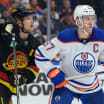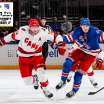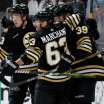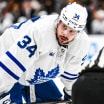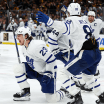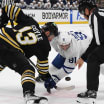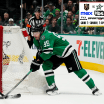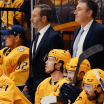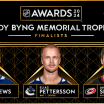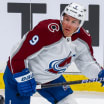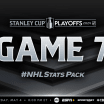NHL.com's Q&A feature called "Five Questions With …" runs throughout the 2018-19 regular season. We talk to key figures in and around the game and ask them questions to gain insight into their lives, careers and the most recent news.
The latest edition features former NHL forward John Cullen, who two decades ago forged a courageous, even miraculous comeback from non-Hodgkins lymphoma and a bone-marrow transplant.
Five Questions with John Cullen
Former NHL forward discusses cancer battle, support from Lightning teammates during recovery
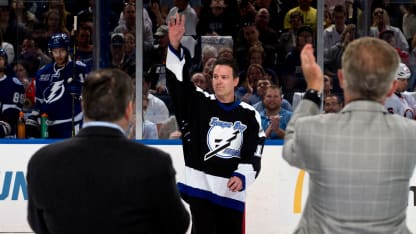
© Scott Audette/Getty Images
More than the vast majority in hockey, John Cullen can relate to Hockey Fights Cancer. Indeed, Cullen battled the disease on the front lines for 18 months, and today he gives thanks for medical science and the love and support of so many in his life.
The 54-year-old native of Puslinch, Ontario was a member of the Tampa Bay Lightning in March 1997 when he had postgame chest pains. He would be diagnosed with non-Hodgkins lymphoma, a cancer affecting the lymph nodes.
Cullen missed the final 12 games of the 1996-97 season and began an aggressive treatment campaign involving chemotherapy and radiation. Thinking he was healthy once more, he was working toward the start of training camp in 1997-98 when he learned that cancer was still in his body. He would miss the full season and had a bone-marrow transplant procedure that at one point left him in cardiac arrest, clinically dead for a minute before he was revived.
But Cullen fought back vigorously. In April 1998, declared cancer-free, he began a second comeback with a goal of returning to the NHL. He did just that, playing four games with the Lightning to start the 1998-99 season, if not at the level he had showed before cancer struck. He would retire having scored 550 points (187 goals, 363 assists) in 621 games for the Lightning, Pittsburgh Penguins, Hartford Whalers and Toronto Maple Leafs in 10 seasons, and take an assistant coaching job under Tampa Bay coach Jacques Demers, a job he held through the season before he stepped away from hockey.
Cullen was voted winner of the 1998-99 Bill Masterton Memorial Trophy, awarded annually to the player who best exemplifies the qualities of perseverance, sportsmanship, and dedication to hockey.
For the past 18 years, he has worked in the automotive industry, today the general manager of a Jonesboro, Georgia, Chevrolet dealership owned by his older brother, Terry.
He will take part in the Lightning's Hockey Fights Cancer Night when they play the Edmonton Oilers at Amalie Arena on Tuesday (7:30 p.m. ET; NBCSN, SNW, NHL.TV).
Cullen and his wife, Valerie, have three daughters: Kennedy, 23, and twins Karlyn and Kortland, 18, and all will have special thoughts this month as the NHL and NHLPA join forces for Hockey Fights Cancer.
Here are Five Questions with … John Cullen:
More than 20 years after you were diagnosed with cancer, which ultimately led to your premature retirement from the NHL, can you put into perspective everything that you went through?
The last 20 years have been obviously great, since I'm still here. When I get into talking about my story, it really brings me back to what Valerie and Kennedy, my young daughter at the time, went through. I can go back to those times and how tough it was -- not because of my first go-around when I went through chemotherapy and radiation, but when it became clear that the treatment didn't eradicate the cancer.
The scary part for me and my family was going through a bone-marrow transplant to knock it all out. I kind of shake my head at what we went through then and suddenly it's 20 years later. I'm just so thankful that I'm one of the lucky ones who made it through. … I have to remind myself, being (cancer-) free for 20 years, if I get upset by something, I try to go back to those days and say, 'Hold on here. Everything's going to be OK.' …
As time goes on, when I look back, how I feel today and how I felt for many years, it feels like it was somebody else. I really can't believe I went through all that. Was I dreaming?
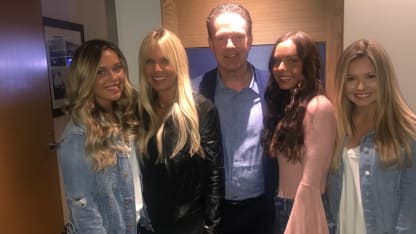
© John Cullen provided photo
When you returned to Tampa for the start of the 1998-99 season, cancer-free, Lightning fans greeted you at the airport with signs of Cullen 1, The Big C 0. Fellow players put your No. 12 on their shoulders, teammate Alexander Selivanov had shaved his head in solidarity. What can you say about the hockey community and the support it gave you?
I had so much support from my family and from people around North America. But the people in Tampa were unbelievable. I remember how incredible it was, the number of people when Valerie and I got off our plane from Boston. It was like I'd won the Stanley Cup, for crying out loud. When we came through the airport, it was truly amazing. Every time I've gone back to Tampa, and I have many times over the years, the fans there, the support they've given me, has been unreal.
Making it back to the League was a pretty big goal of mine. I was about to come back to camp (in the fall of 1997) feeling great, working out hard, and just before camp started I found out that I still had cancer. Going through that, missing a whole year and then coming back? That was pretty defining to me.
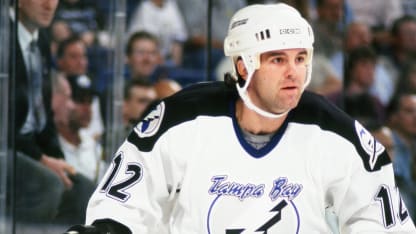
© Getty Images
Did you at any point find that your hope was flagging, or did you view cancer as a foe that without question you would defeat?
When I went through my chemotherapy and radiation, I worked out through it. Never lost a pound, felt great. But I didn't know many people who had gone through a bone-marrow transplant. They said it was hell and I said, 'Don't worry, I'll handle it. Just make sure you put an exercise bike in my hospital room.' My doctor in Boston, Lee Nadler, one of the world's top lymphoma specialists, said, 'You're not going to need an exercise bike.' I said, 'Oh yes, I am.'
About three days into it, I realized I didn't need a bike. It took so much out of me. I lost 30 pounds during the bone-marrow situation. There were some times in there when it was very, very, very tough. It depletes your system and I'd wake up sometimes thinking, 'Man, I'm not quite sure I'm going to make it through this.' It was hell. Thank the Lord I made it.
Every cancer is different, everyone faces it differently. That said, when someone comes to you looking for a few words of wisdom or encouragement as they face the challenge of their illness and the treatment of it, what do you say?
The first thing I say is, 'Look at me, at what I went through, to the extent of having a bone-marrow transplant, given less chance to survive. And I'm here today.' I think all you can do when someone is going through cancer, you have to stay as positive as you can. It's up to the patient to fight, to the very last minute and hope for the best. And I always like to talk to members of the family of the patient, too, because they're a big part of what someone is going through. They've got to be the rock, the support, for whoever has the illness.
Every day that you woke up would be a victory but through it all, what was the most difficult challenge, the highest hurdle to clear, and what did you learn about yourself during treatment and in the past 20 years?
I handled chemo and radiation therapy really well but the bone-marrow transplant was the toughest of all. My wife and nurse are taking me down the hallway and all of a sudden my wife is about 10 people deep because they yell 'Code blue!' (Cullen having gone into cardiac arrest). When I think about that situation for her, that's pretty tough to deal with.
I've always been a battler. Through my hockey career, I was a guy who would get back up every time I was knocked down. I had to take that attitude in treatment, too. Doing the best I could to fight it. I've always said to myself, 'Why did I make it, and people I knew closely didn't?' My mother died of melanoma cancer. I played in Toronto under coach Pat Burns (who died of cancer in 2010). Shawn Burr (who died in 2013 of brain trauma after a fall at home) was my linemate in Tampa, one of the greatest teammates a guy could have… they didn't make it. That's what I had the toughest time with. I made it and some people close to me didn't. It's a tough deal and I'm just the lucky one, that's all.

